During an initial drive at an event for invited media, Hyundai's second iteration of the Genesis luxury sedan impressed me, along with pretty much everyone else. While the original Genesis was a good car given how much it cost, the second seemed much better, even a thoroughly credible alternative to prestigious European sedans. But I had less than two hours in the driver seat that day. Plus we didn't drive the new 2015 Genesis back-to-back with any other cars. Plus our expectations were low. My expectations suitably adjusted, I've been waiting for the 2016s to spend more time in the Genesis, ideally back-to-back with one of its benchmarks. An opportunity recently presented itself. I'd been driving a 2016 Audi A6 for a week. Might a 2016 Genesis 3.8 be available the following week? One was.
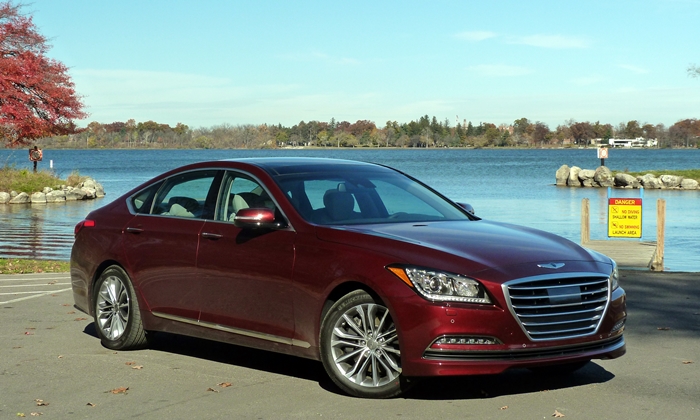
A little chunky at the ends, especially the tail end, but a big handsome sedan. more Genesis photos
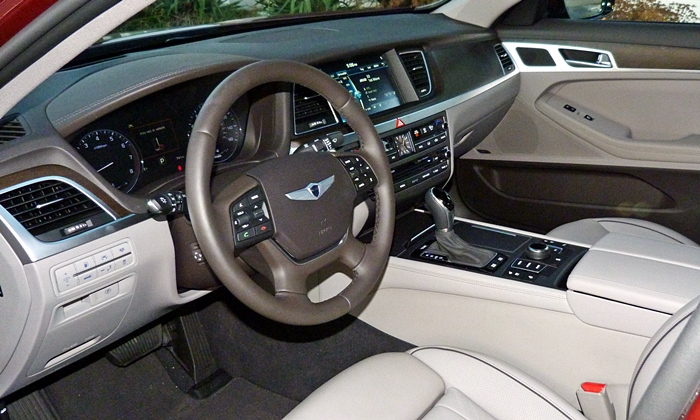
The design inside the Genesis is a little plain. Real matte-finish wood with the top package.
| |
Compared to the A6 / S6 |
| Price or payments |
 Better
Worse
Better
Worse
|
The new Hyundai Genesis is about as good as the Audi A6 in many respects, something that couldn't be said of the original, but "about as good" rather than "significantly better" doesn't warrant a "why to buy" in itself. Rather, it's the combination of "about as good" with a much lower price that makes the new Genesis a very appealing car.
While the tested Genesis listed for nearly as much as the tested A6, $53,100 vs. $54,725, the Hyundai was fully equipped, while the Audi was far from it. Generously equip both, and the Genesis lists for over $8,000 less, $49,600 vs. $57,900. Check off fewer boxes, and the difference remains the same as long as the two cars are similarly outfitted. Dropping all-wheel drive reduces the Hyundai's price by $2,500, the Audi's by $2,200. A Genesis with no options is still packed with features, and lists for under $40,000.
Not stuck on new? One-year-old used examples can be found for $30,000. This is a lot of very good car for $30,000. As these cars continue to depreciate, I'll be recommending them more and more to people seeking a large, comfortable sedan.
One problem with the pricing of the Genesis: all options are combined in three tiered packages that each cost $3,500 to $3,900. Even if the only option you want is memory for the driver seat or a sunroof, it'll cost you $3,900. You can pick and choose your options more with the A6 and other German competitors.
| Safety & braking |
 Better
Worse
Better
Worse
|
Hyundai expended a tremendous amount of effort on achieving top safety scores with the new Genesis, and the Insurance Institute of Highway Safety (IIHS) awarded the car its highest rating. Beyond good scores in every crash test, the Genesis can be purchased with a full array of effective safety aids.
While the Audi A6 also received the highest rating, its automatic braking system failed to slow the car entirely in the 12-mph test, and did hardly anything in the 25-mph test. The Hyundai's automatic braking system successfully avoided a collision in both tests. Only the systems in the Acura RLX and Mercedes-Benz E-Class were as effective.

Another good angle despite the excessive visual bulk in the rear fascia. Some BMW influence here.
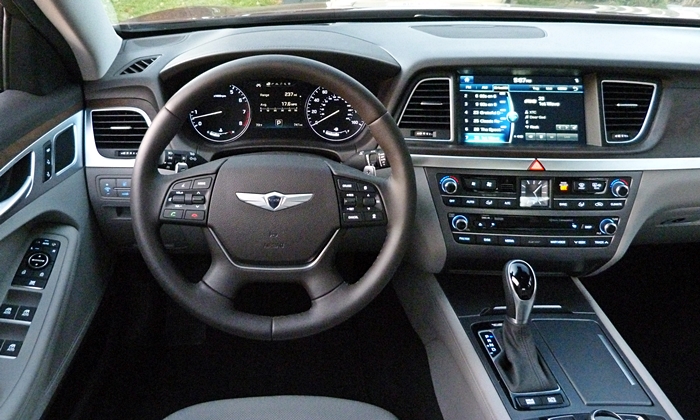
Big knob, touchscreen, or conventional knobs and buttons? All of the above!
| Reliability & durability |
 Better
Worse
Better
Worse
|
When I first reviewed the new Genesis, it hadn't even reached dealers yet, so of course no reliability data were available. The original Genesis had some common problems during its first few model years, so it wouldn't have surprised me if the same was the case with the thoroughly revised second-generation car.
Well, the only somewhat common problem involved a tendency for the Hankook tires initially fitted to the car to form flat spots in cold temperatures. We don't count tire issues in our reliability stats, as their cause can be hard to determine. Also, tires are warrantied separately by the tire manufacturer. In this case, though, Hyundai not only switched to a different tire (Michelins for the V6, Continentals for the V8) on new cars but offered to switch the tires on already sold cars. It's rare for a company to take such a big step in response to a small number of minor complaints.
And the car itself? A few dozen members have now had a 2015 Genesis for a year or more, and the great majority of their cars didn't require a single repair last year. This is very good for a luxury sedan in its first model year. Granted, Audis tend to be about equally reliable during their first few years, then worsen. It's still too early to say how reliable the new Genesis will be when four-plus years old. But even if it has more problems when older, repairs are likely to be simpler and much less expensive than they tend to be for an Audi. So I'm comfortable listing reliability among the reasons to buy a Genesis.
Also note that the Genesis has a longer standard warranty than the A6, 5/60 vs. 4/50 on nearly the entire car and 10/100 (for the first owner) vs. 4/50 on the powertrain.
| Front seat support & comfort |
 Better
Worse
Better
Worse
|
Most cars in this segment have comfortable seats (the firmer, flatter ones in the Audi being a partial exception for me, maybe not for you). Even in such lofty company the front buckets in the Genesis compare well. They're perhaps the cushiest in the segment, yet they're also properly supportive. In hard cornering the side bolsters (adjustable for the driver) prove more effective than the less form-fitting seats in the Audi.
The headrests in the new Genesis don't adjust fore-aft, so luckily they're not positioned too far forward. Like the rest of the seat they're deeply contoured and quite cushy.
The new Genesis is about the same length as the old one, and is only a couple inches longer than the Audi (196.5 vs. 194.2 inches). But it rides on a considerably longer wheelbase (118.5 vs. 114.6 inches) and is also a little wider (74.4 vs. 73.8 inches) and taller (58.3 vs. 57.8 inches). These generous dimensions pay off in two more inches of combined legroom and nearly an inch more shoulder room. Based on interior measurements, the Genesis is actually a large sedan, not a midsize.
Still, all is not golden in the back seat of the Genesis. Like the Audi's and most others, its cushion is mounted a little too low to provide sufficient thigh support.
| Ride smoothness |
 Better
Worse
Better
Worse
|
The chassis of the first-generation Genesis wasn't tuned well. Its handling lacked precision, and its ride often felt unsettled. For the second-generation Genesis, Hyundai enlisted the suspension gurus at Lotus Engineering. The resulting tweaks to the spring rates, dampers, and stabilizer bars have yielded a ride as composed as any in the segment. Even some truly awful Detroit-area roads failed to knock the car off its intended path or elicit harsh reactions. This said, the car's ride is far from pillowy. Hyundai's bogies were clearly European.
Noise levels are also about as low as you'll find. Side windows in both rows are fitted with laminated glass as standard equipment. This said, over rough pavement the doors softly twitched against their seals. Either the doors on the Genesis aren't as solidly mounted as those on competing cars, the body structure isn't as rigid (not likely since this was a priority), the seals needed lubricating, or some combination of these. I did not notice this noise during my initial drive back in 2014.
The latest Audi A6 also rides smoothly and quietly, but doesn't seem as insulated. In comparison, the Genesis has more of a "big car" character, which will appeal to those seeking a luxury sedan more than those seeking a sport sedan. I tend to favor the more agile feel of the Audi, but also found the new Genesis a very pleasant car to drive.
| |
Compared to the A6 / S6 |
| Brand reputation & image |
 Better
Worse
Better
Worse
|
Objectively, the brand shouldn't matter. But many potential buyers won't even consider the Genesis because it's a Hyundai. Hyundai itself has been forced to accept this, and with the 2017s (available starting in June or July) will make Genesis a separate brand. With this change, the Genesis sedan will become the Genesis G80.
The Genesis badge still won't have the prestige of an Audi's four rings, much less a BMW roundel or Mercedes-Benz star, but it should prove less of a deal-killer.
There still won't be separate Genesis dealerships, so the showroom ambiance and level of service still won't be those of a full luxury brand.
| Fuel economy |
 Better
Worse
Better
Worse
|
While competitors have been switching to relatively small turbocharged engines, the Genesis continues to rely on larger normally aspirated ones. Even the base car's 3.8-liter V6 is nearly twice the size of the Audi's turbocharged 2.0-liter four-cylinder engine. Also, Hyundai doesn't yet offer automatic stop/start. The most significant impact: the Genesis gets much worse fuel economy.
With two-wheel drive, the A6 2.0T scored 24 mpg city, 35 mpg highway in the EPA's tests, the Genesis 3.8 only 18/29. Add all-wheel drive, and the Audi's ratings fall to 22/32, the Hyundai's to 16/25, not good. Hyundai has developed a new turbocharged 3.3-liter V6 to replace the 3.8, but it isn't clear how soon this new, more efficient and more powerful engine will be available in the Genesis G80. It won't be available when the car arrives this summer, so most likely the 2018 model year.
According to the trip computer, my real-world fuel economy was well above the EPA figures. Only when I drove the Genesis fairly aggressively did the trip computer average fall below 20 mpg. On my usual suburban route it averaged around 23 mpg, and on a 70-mph highway it averaged about 30 mpg. The former was still a few mpg short of the Audi, but the latter was at least as good. If the trip computer is accurate, the fuel economy of the Genesis isn't nearly as dismal as the EPA ratings indicate.
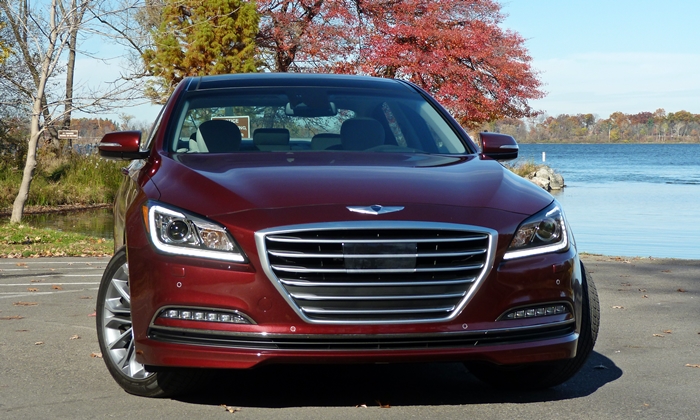
Big Audi-esque grille. From some angles the sensor for the adaptive cruise is overly obvious.
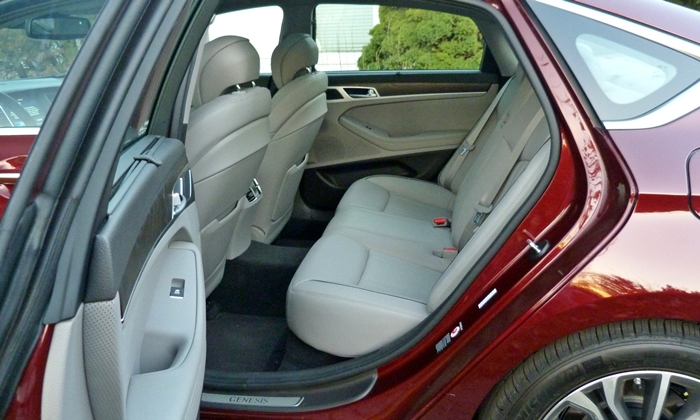
The back seat could be more comfortably positioned, but it's nicely shaped and roomy.
| Driving position & visibility |
 Better
Worse
Better
Worse
|
The original Genesis had a high, upright driving position. You sit lower in the new car, or the instrument panel is higher. Probably both. The windows certainly aren't as tall. Consequently, the view forward isn't nearly as open. Cars in general have been moving in this direction, but that doesn't mean we have to like it.
In this segment, forward visibility is better in most competitors, and is much better in the Audi. Enabled by an infotainment display that motors up into position, the A6's lower, more compact instrument panel occupies far less visual as well as physical space than any other in the class. The instrument panel in the Genesis appears bulky in comparison.
The Audi also has a lower, less intrusive center console. While this doesn't affect visibility, it does affect perceived roominess. The Audi doesn't have quite as much shoulder room as the Genesis, at least not according to the spec sheets, but its interior feels airier and more open.
| Controls and instruments |
 Better
Worse
Better
Worse
|
At first glance, the infotainment interface in the new Genesis looks much like that in the A6. On the center console, a large knob and the buttons arrayed around it navigate and operate the infotainment display mounted high on the instrument panel. In practice, the Hyundai system doesn't work as well. It's not nearly as easy to find the correct button without looking down at the console (taking your eyes off the road). It would help if what each button does in each situation was portrayed on the display as it is in the Audi. Less of an inconvenience, but an inconvenience nonetheless: sunlight washes out the lights on the switches for the cooled seats, making it very hard to tell what they are set to.
Luckily, few if any operations absolutely require the console-mounted buttons. In many cases it's easier to use one of the alternate methods: other buttons on the center stack, or simply operating the display as a touch screen. It seems that Hyundai couldn't decided on a single control scheme, so they provided three. Each driver can decide which they prefer.
| Cargo capacity |
 Better
Worse
Better
Worse
|
A 15.3 cubic-foot trunk is about average for the segment, and a bit better than the A6's 14.1. But the rear seat in the Genesis cannot fold to expand the trunk. A folding rear seat is available in the Audi, BMW, Cadillac, and Mercedes.
| |
Compared to the A6 / S6 |
| Exterior styling |
 Better
Worse
Better
Worse
|
The original Hyundai Genesis had a pleasant enough exterior appearance, but it wasn't distinctive or leading-edge in any way. The new Genesis looks nothing like it. The proportions, the design language, even the shape of the grille--all are completely different. The new look, though a little stiff and bulky through the lower body, is crisper, more athletic, and much more aligned with recent design trends. There are shades of Audi in the big grill, strong shoulders, and flowing roof line, but overall the new Genesis looks like nothing else. Decidedly not Audi: the relatively long distance between the front wheel and the passenger compartment. This generally requires a front engine, rear-wheel-drive chassis, which Audi doesn't have. I wouldn't call the second-generation Genesis beautiful, but it is handsome, and upscale. You're clearly looking at a big, expensive sedan.
The Audi A6, with softer curves and less athletic proportions, doesn't have as much presence, especially not in its rear quarters. But Audi also offers the related, almost stunningly attractive A7 hatchback.
| Interior styling |
 Better
Worse
Better
Worse
|
The interior styling of the Hyundai Genesis has changed as much as its exterior styling, but not in the same way. Like the new exterior, the new interior appears more up-to-date. But, unlike the exterior, it's now less distinctive--or less idiosyncratic, to put a more positive spin on it.
The primary influence appears to have been BMW, but with a cleaner integration of elements, additional square inches of wood trim, and piping in a contrasting color on the seats. The interior ambiance is warm with the tan interior (which includes brown wood), less so with the light gray interior in the tested 2016 (which includes black wood).
The basic theme might even be overly plain, with nearly straight lines and a minimal number of simple shapes. When I first saw the 2015 Genesis at the auto show, my initial impression was that the interior was much less stylish than that of the more aggressively opulent Kia K900 (which has another $10,000 to justify).
But, with more exposure, the interior of the new Genesis seems suitably upscale, if still not artful the way the Audi A6's is. The materials are of good quality, and the fits are tight and precise. The old car's downscale silver plastic trim plates are gone. Spring for the 5.0 or the 3.8 with the Ultimate Package, and both the wood and the gray aluminum on the center console are the real deal. The matte finish of the former elevates the ambiance a notch or two. The gray aluminum trim works better with the gray interior than the tan one.
| Powertrain performance |
 Better
Worse
Better
Worse
|
The 311-horsepower Genesis 3.8 can get to 60 mph in under seven seconds, about even with the A6 2.0T and as quick as most people will ever need it to be. This said, fit the Audi with the 3.0T's supercharged V6 engine and it's much quicker than the Genesis 3.8 and about as quick as the 420-horsepower Genesis 5.0--and Audi offers two turbocharged V8s that are even stronger.
Beyond raw performance, the Genesis 3.8 sometimes can seem slow to respond thanks to the programming of its eight-speed automatic transmission and of its traction control system. The traction control systems in most competitors are much more sophisticated, and are consequently less obvious in their operation. Neither is a big deal, just something that could be improved.
The Hyundai V6 does sound nicer than the Audi turbocharged four; it would be a shock if it didn't, as sixes inherently sound better than fours.
Hyundai has announced that a 365-horsepower turbocharged 3.3-liter V6 with more midrange thrust than the 5.0-liter V8 has been developed to replace the 3.8, but this change might not happen until the 2018 model year.
| Handling |
 Better
Worse
Better
Worse
|
The new Hyundai Genesis handles with confidence-inspiring balance and composure, a dramatic improvement over the original. Though not that of a hardcore sport sedan, the new chassis strikes an excellent balance between ride and handling. Whatever the tuning assistance of Lotus cost, Hyundai's money was well-spent.
Switching from normal to sport mode modestly firms up the already firm steering and shifts up to 90 percent of the torque to the rear wheels (with all-wheel drive), making oversteer-on-demand somewhat possible. But sport mode also holds the transmission in a lower gear, so it can't be used much of the time without significantly harming fuel economy. Hyundai needs to copy a bit more from Audi and allow drivers to select which systems are affected when switching into sport mode, or add a customizable mode.
Even in sport mode the Genesis feels larger and considerably less agile than the Audi, and its steering provides less nuanced feedback. Which handles better? For me, the Audi. But some people will prefer the heftier feel and rear-wheel-drive dynamics of the Genesis.
My week with a 2016 Hyundai Genesis confirmed that it looks and drives like a first-rate upscale sedan. Compared to the front-wheel-drive sedans that target the Lexus ES, the Genesis competes in a different league with cars like the Audi A6, BME 5-Series, and Mercedes-Benz E-Class. While I personally would prefer more agile handling and better outward visibility, for those seeking a large luxury sedan (rather than a midsize sport sedan) little improvement remains necessary. One of our members owns both a 2014 E-Class and a 2015 Genesis, and says he'd prefer the Genesis even if they cost the same. But they don't cost the same--the Genesis costs far less, while earning top safety scores and rarely requiring repairs in its first year.
Because it does so many things so well at a relatively low price, I've been recommending the new Genesis to anyone seeking a large luxury sedan. The main limitation: even if the price of the Genesis is much lower that that of the Audi A6 et al., many people don't have $40,000 to spend. But those with lower budgets just need to wait, and perhaps not very long. The Genesis depreciates like a luxury car, which is to say quickly. A very good value in the forties, it'll be an incredible value in the twenties, especially if it continues to score well in our reliability survey.
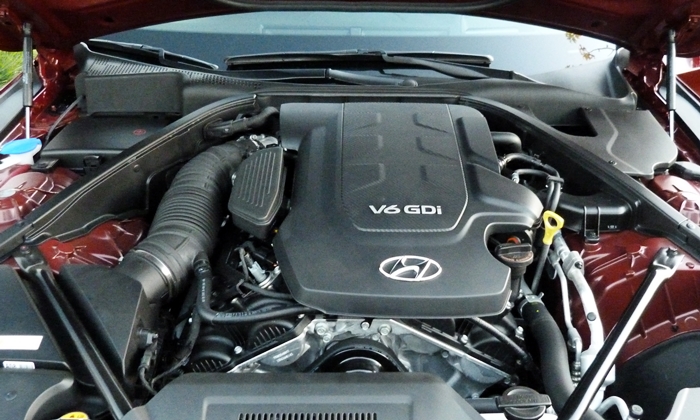
Big aluminum block visible beneath the usual cover.
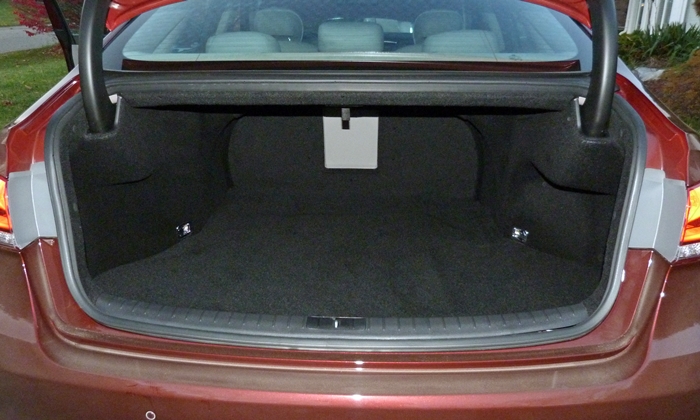
The trunk is usefully large, but you can't fold the rear seat to expand it.
See more 2016 Hyundai Genesis photos
Hyundai and Audi each provided an insured car for a week with a tank of gas. Michael Williams of Southfield Chrysler (in MI) helpfully provided a 300S for a comparison drive.











